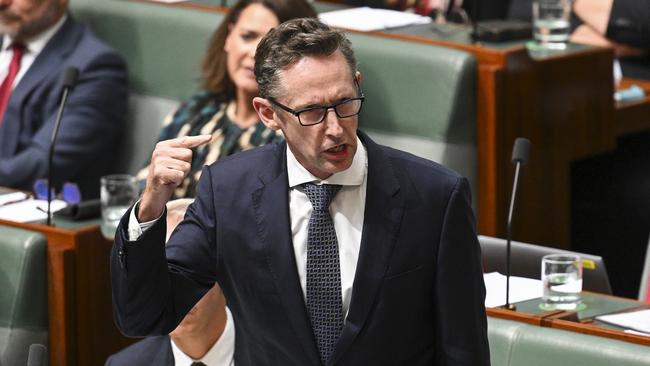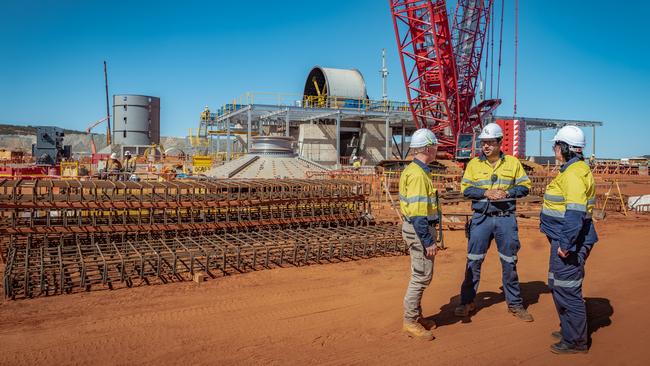Tasmanian crypto mines the centre of bitcoin court case; Stephen Jones a surprise Labor fundraising star


Call us a bit slow on the uptake, but Margin Call hadn’t quite realised that Australia was such a hotbed of crypto bro litigation.
Iris Energy founders Dan and Will Roberts might be the target of action by PwC’s Canadian bankruptcy arm, but the fate of the $US1.4bn NASDAQ-listed company is by no means the most fascinating crypto blue happening locally.
That may be the “rain and hellfire” stoush over control of Tasmanian bitcoin mines, with US company Swan Bitcoin launching legal action this week against a swathe of its former employees and directors over an alleged attempt to steal a $US1bn business.
According to the legal action Swan had taken advantage of cheap power prices in Tasmania to establish bitcoin mining centres that were producing one in every 50 of the world’s imaginary currency.
The employees, including a Western Australian based investment director, allegedly conspired with cryptocurrency major Tether to all quit on the same day and hand over trade secrets to a new company, Proton, that cut Swan’s lunch on a lucrative contract.
Does it matter? Not at all.
But what’s at stake? A $US1bn IPO that ultimately fell over.
Hottest ticket in town
Amid a blitz of pre-election fundraising, who is the hottest Labor ticket on offer? Anthony Albanese? Chris Bowen? Jim Chalmers?
The surprise answer appears to be Assistant Treasurer Stephen Jones. Margin Call is told Jones’s name recently sold out two fundraisers in record time – tickets to a Sydney boardroom lunch next week went within minutes, and a follow-up in Adelaide a week later lasted only barely longer.
Jones is hardly the most popular minister in business circles. To say he’s widely regarded as a bit of a goose is the most kind translation of the most common reactions.
He’s still under pressure over the government’s response to Michelle Levy’s Quality of Advice Review, locked battle with accountants over contentious proposed laws to rein in rogue tax agents, and fighting battles on host of other fronts as well.
Which may well be the key to his sudden popularity.
Jones’s office is said to have become so adept at fending off requests for a chat about the issues from industry players that a paid lunch looks to be the only way to get time to press a case.

Jones may be the surprise hit of the election season luncheon round, but his ministerial colleagues are certainly not shirking their duties.
A quick straw poll of industry sources suggest Labor has issued more than 20 invitations so far this financial year for business to dine with its ministers, close to double the count for their Liberal counterparts.
Labor’s list includes headline events with the Prime Minister and Cabinet in Perth in early September, the annual Federal Labor Business Forum in Sydney in August, as well as a host of lesser functions.
October brings at least nine Labor fundraisers, including Jones’ sold-out events and functions headlined by Attorney-General Mark Dreyfus, Health and Aged Care Minister Mark Butler and Home Affairs Minister Tony Burke.
Labor’s Business Roundtable is charging $3000 a head for members for its to attend, and $4000 for non-members, suggesting October could be a bumper month for the party.
But if you’re thinking of attending, Labor is keen to make sure its functions don’t become another front in the political boys club.
“Federal Labor Business Forum invites all members to join the Federal Labor Party in championing gender equality. We encourage equal representation when nominating your event guests,” the invitations say.
Lithium game
Mining is a tough game when prices are down and you owe a lot of money.
On Monday, Liontown Resources boss Tony Ottaviano lauded “the strong planning capabilities and operational excellence” of the company’s workforce, after waving goodbye to Liontown’s first shipment of lithium concentrate to a Chinese customer.

And on Tuesday the axe fell on that same workforce.
Liontown cut about a third of its head office staff, at a cost of about 30 jobs.
The company is understood to be culling about 10 per cent of its total workforce, with job losses ongoing in operational roles.
The cuts were hardly a surprise, given the malaise afflicting the lithium sector.
But they must surely rankle, given how much Liontown had to shell out after trashing two debt packages in the space of half a year.
Liontown’s annual report shows it cost about $21.3m to replace syndicated loans with new debt facilities after the lithium market crash.
On top of that, Liontown paid out about $4m to its corporate advisers over a $6.6bn bid for the company last year by global lithium giant Albemarle – a takeover initially rejected by the company and ultimately stymied by the intervention of Gina Rinehart’s Hancock Prospecting.
Liontown’s market capitalisation on Wednesday? $1.9bn.





To join the conversation, please log in. Don't have an account? Register
Join the conversation, you are commenting as Logout